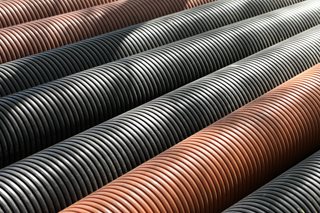Advances in technology have made geothermal energy an increasingly credible alternative to power derived from conventional fuels. The environmental impact of fossil fuel use is one of the considerations driving research into geothermal technology. In addition, rising energy prices and dwindling fossil fuel reserves have created a dire economic need for alternatives.
Locating a site for a geothermal energy installation is complex. A number of requirements must be met: chiefly, the presence of sufficient geothermal fluid (water, vapor or gas) and a reservoir of heat that won't quickly become exhausted. Among other approaches, mineral exploration techniques can be used to assess the viability of a potential geothermal site.
Setting up a geothermal installation requires a range of specialized materials and equipment. Drilling equipment and other supplies such as
drilling fluids are only the beginning. To make use of the heat trapped below the earth's crust, it's necessary to drill down into the ground — often for a considerable depth. The structural stability of geothermal boreholes must be maintained. This requires well screens, risers and other
geothermal fittings.
A geothermal well requires long-term stability to remain productive. To provide stability for a borehole, well liners are generally used. These help to support the material forming the sides of the borehole and preventing it from collapsing. Well liners also keep larger pieces of rock or debris from falling into the borehole, preventing it from becoming blocked. They can be made out of various materials.
A reliable alternative to using metal screens is the use of well screens manufactured from polymers (plastics). Pipes and tubes made from plastics such as High Density Polyethylene (HDPE) and Polyvinyl Chloride (PVC) are inexpensive, durable and widely available. Standard pipes are perforated with round holes, which in some cases can be blocked by debris. Round or angular pieces of gravel or fragments of backfill can become lodged in the holes, occluding much of their area. If a significant number of holes become blocked, this has the effects of diminishing the ability of the pipe to collect. To solve this problem, pipes with slot-shaped holes can be used. Because of the shape of the hole, it's much less likely that the entire slot will become blocked.
PVC Plus provides a range of quality slotted collection systems, both in PVC and HDPE. These products are manufactured to a high standard from top-grade materials, ensuring excellent performance and longevity. The PVC Plus range is a cost-effective and reliable solution to all of your geothermal drilling, geotechnical and mineral exploration needs.
